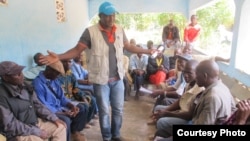Health teams working in Guinea are ramping up outreach efforts in the country’s mining regions, where a concentrated and mobile workforce provides a ripe environment for spreading the deadly Ebola virus, according to a UNICEF representative.
"The situation in Guinea remains worrying," Christophe Boulierac, a Geneva-based spokesman for the United Nations children’s agency, said after completing a 10-day tour there last week.
Ebola has sickened at least 2,000 people in Guinea and killed at least 1,233, with the infection rate rising slightly since October, the World Health Organization reported in its latest status update.
Boulierac traveled to two regions of Guinea: the West African country’s northern mining region and its southeastern rainforest, where the current outbreak began nearly a year ago.
In and around the northeastern gold-mining town of Kouremale, near the border with Mali, "you can meet miners from all West Africa," Boulierac said, speaking by phone from near Conakry, the capital.
These “artisan” or independent miners’ movements – from different countries and among shifting worksites – offer heightened potential for contagion once they return to their families, he added.
Ebola has migrated to Mali, where eight cases of infection have been reported since October. UNICEF, other international partners and local governments are "scaling up their action in this strategic area in order to contain the outbreak," Boulierac said.
They’ve begun setting up village "watch committees," recognizing the importance of local involvement. Each five-person panel has a youth, woman, traditional healer, religious leader and public health representative, Boulierac said. Health officials recently set a goal of 132 such committees in the gold-mining region; within a few days, they were halfway there.
Mining, like other industries in Guinea, Liberia and Sierra Leone, has been rocked by Ebola. Health experts, including some from the U.S. Centers for Disease Control and Prevention, have met regularly with officials of major firms to advise them of risks and safety measures, several CDC personnel who’d worked in Guinea told VOA earlier this fall.
The global mining company Rio Tinto, a partner in the Simandou iron ore project in southeastern Guinea, said it has followed WHO recommendations in implementing “sensible measures to minimize our employees’ exposure” as they assess whether to open mines, spokesman David Outhwaite told VOA.
Outhwaite wrote in an email that Rio Tinto regularly briefs its 900 employees about Ebola and has conducted broader awareness campaigns. Its efforts range from distributing more than 10,000 “prevention kits” of soap and chlorine, to building latrines to improve a town’s sanitation, to donating at least $100,000 to WHO and providing equipment such as 20 all-terrain vehicles to reach people in remote areas.
British-based London Mining, with iron ore mining operations in Sierra Leone, helped build a 130-bed treatment center and contributed funds to the country's Ebola fight, The Guardian reported.
Corporate efforts complement what happens at the community level.
UNICEF's Boulierac said the village watch committees aim to improve communication and compliance.
“This allows WHO to do contact tracing, this allows us to find out if there are orphans in need, this allows the Red Cross to access the village and bring the sick people to treatment centers” or safely remove corpses.




